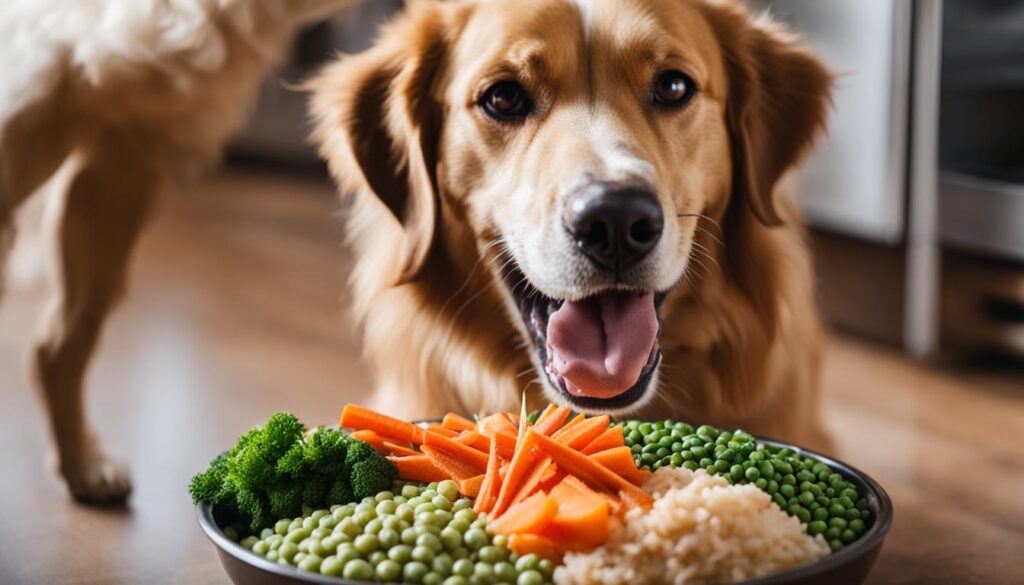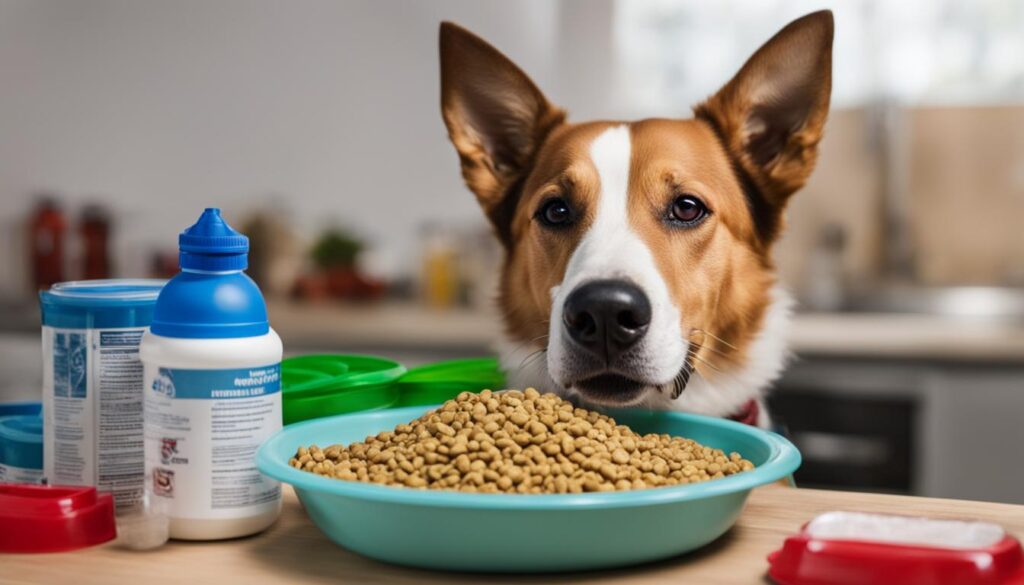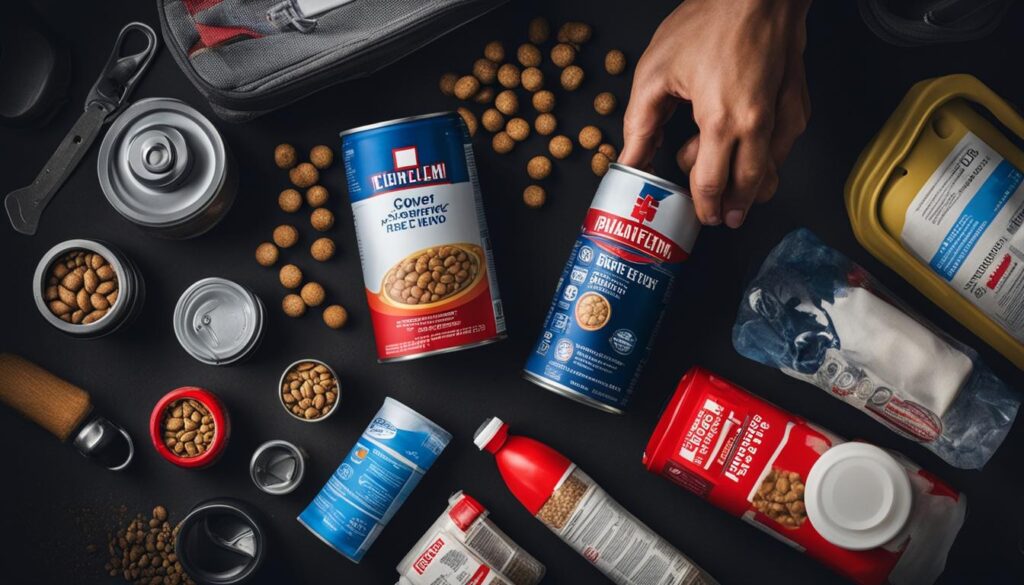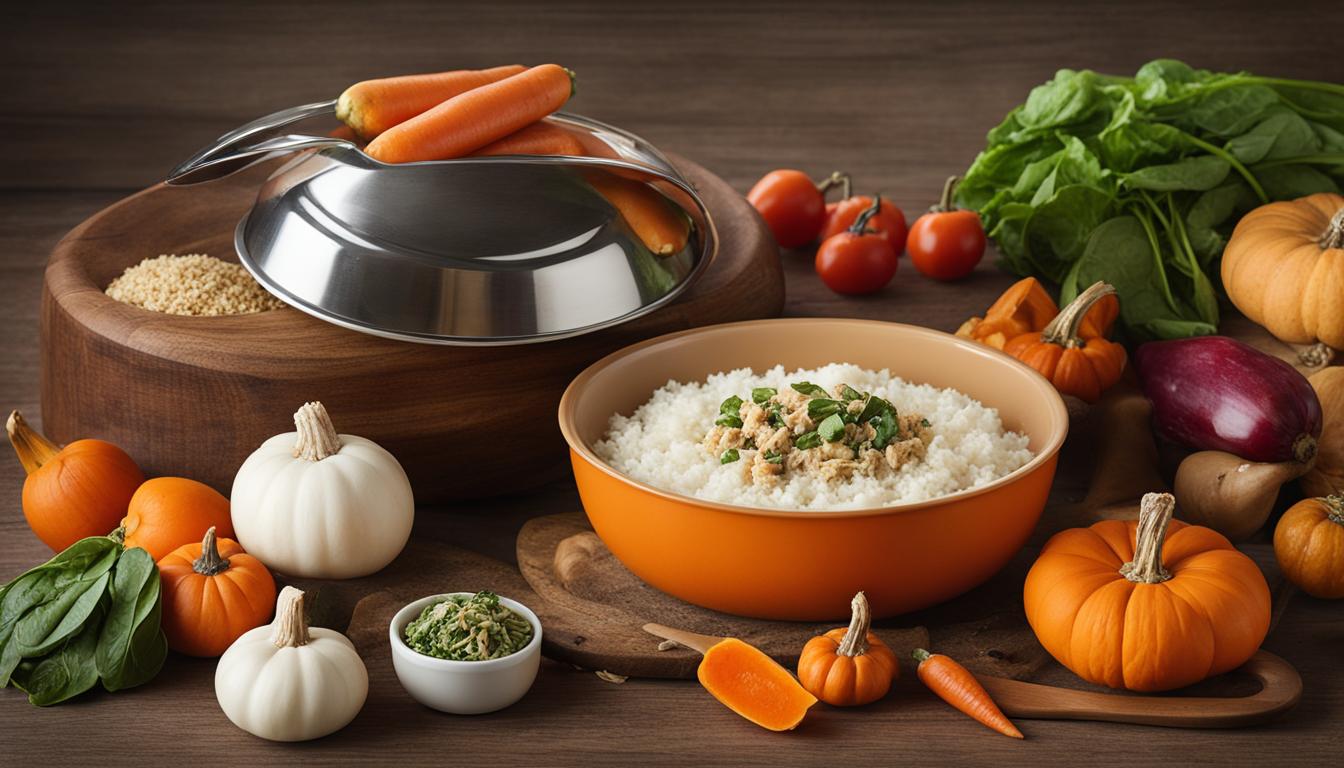With the recent shortage of dog food in supermarkets due to a surge in new pet adoptions during the lockdown, it’s important to have alternative options to ensure your dog gets the nutrition they need. While these emergency diets should not replace a proper diet, they can serve as temporary solutions. Always consider your dog’s dietary needs and allergies when choosing ingredients.
Key Takeaways:
- During a dog food shortage, you can create quick and safe emergency meals for your dog using ingredients you already have at home.
- Safe alternatives include bananas, blueberries, broccoli, carrots, lean meat, plain boiled rice, oatmeal, peanut butter (without xylitol), peas, scrambled eggs, and sweetcorn.
- Avoid toxic foods like avocado, alcohol, caffeine, cooked bones, grapes, onions, salt, sugar, sweets, chocolate, and xylitol when preparing emergency meals.
- Human meals can be used as temporary solutions, but they are not nutritionally balanced or complete like commercial dog foods. Limit their use to a maximum of one week.
- Consult with a veterinarian for specific dietary recommendations for dogs with serious illnesses, recovering from surgeries, or accidents.
Safe Alternatives for Emergency Dog Meals
In the event of a dog food shortage, it’s important to have safe alternatives on hand to ensure your furry friend gets the nutrition they need. Homemade dog food can be a temporary solution until you are able to restock their regular food. Here are some emergency homemade dog food options:
Emergency Homemade Dog Food
If you’re unable to find your usual dog food, you can create a DIY meal using ingredients you may already have in your kitchen. Here is a list of safe and nutritious foods that can be used to make do in a pinch:
- Bananas: Rich in potassium and fiber, bananas make a healthy addition to a homemade dog meal.
- Blueberries: Packed with antioxidants, blueberries are a great source of vitamins and minerals for your dog.
- Broccoli: High in fiber and vitamin C, broccoli can be lightly steamed and added to your dog’s meal.
- Carrots: Crunchy and full of vitamins, carrots are an excellent addition to homemade dog food.
- Cooked boneless lean meat: Chicken, turkey, or beef can be cooked and added to your dog’s meal for protein.
- Onion-free gravy: A small amount of onion-free gravy can add flavor to your dog’s food.
- Plain boiled rice: Easily digestible, plain boiled rice can be a filler for your dog’s meal.
- Plain oatmeal: Cooked and unsweetened oatmeal can be a healthy addition to your dog’s diet.
- Peanut butter (without xylitol): A spoonful of peanut butter can be a tasty treat for your furry friend.
- Peas: Rich in vitamins and minerals, peas can be cooked and added to your dog’s meal.
- Scrambled eggs: Cooked eggs can be a good source of protein for your dog.
- Sweetcorn: A small amount of plain cooked sweetcorn can be added to your dog’s meal.
Remember to provide a combination of these foods to ensure a well-balanced meal for your dog. It’s important to feed them a variety of nutrients to keep them satisfied until you can restock their regular food.
Table: Comparison of Emergency Dog Food Options
| Food | Nutritional Benefits | Feeding Instructions |
|---|---|---|
| Bananas | Rich in potassium and fiber | Can be mashed and served as a treat or mixed with other ingredients |
| Blueberries | Packed with antioxidants and vitamins | Can be served as a snack or mixed with other ingredients |
| Broccoli | High in fiber and vitamin C | Lightly steam or cook and mix with other ingredients |
| Carrots | Crunchy and full of vitamins | Raw or cooked, can be served as a snack or mixed with other ingredients |
| Cooked boneless lean meat | Good source of protein | Cook thoroughly and mix with other ingredients |
| Onion-free gravy | Enhances flavor | Add a small amount to the meal for taste |
| Plain boiled rice | Easily digestible and filling | Cooked and mixed with other ingredients |
| Plain oatmeal | Healthy addition to the diet | Cooked and mixed with other ingredients |
| Peanut butter (without xylitol) | Tasty treat and source of protein | Use in small amounts as a treat or mix with other ingredients |
| Peas | Rich in vitamins and minerals | Cooked and mixed with other ingredients |
| Scrambled eggs | Good source of protein | Cooked and mixed with other ingredients |
| Sweetcorn | Can be a tasty and nutritious addition | Cooked and mixed with other ingredients |
Note: Always consult with your veterinarian before making any major changes to your dog’s diet, especially in emergency situations. They can provide guidance on portion sizes and any specific dietary needs your dog may have.
Foods to Avoid in Emergency Dog Meals
When preparing emergency meals for your dog during a food shortage, it’s important to be aware of certain foods that should be avoided. While many human foods are safe for dogs, there are specific ingredients that can be toxic to them. Here are some foods to steer clear of:
- Avocado: Avocados contain a substance called persin, which can be harmful to dogs and cause symptoms such as vomiting and diarrhea.
- Alcohol: Alcohol can have severe and potentially fatal effects on dogs, including central nervous system depression and respiratory distress.
- Caffeine: Caffeine, found in coffee, tea, chocolate, and some sodas, can lead to increased heart rate, restlessness, and even seizures in dogs.
- Corn on the cob: While corn itself is not harmful to dogs, the cob can pose a choking hazard or cause intestinal blockage if ingested.
- Cooked bones: Cooked bones can splinter and cause serious injuries to a dog’s digestive system, potentially leading to blockages or perforations.
- Grapes: Grapes and raisins can be toxic to dogs, causing kidney failure in some cases.
- Onions: Onions and garlic contain compounds that can damage a dog’s red blood cells and cause anemia.
- Salt: Excessive salt intake can lead to electrolyte imbalances and dehydration in dogs.
- Sugar and sweets: Foods high in sugar can contribute to obesity, dental problems, and even diabetes in dogs.
- Chocolate: Chocolate contains theobromine, a stimulant that can be toxic to dogs and affect their heart and nervous system.
- Xylitol: Xylitol is a sweetener commonly found in sugar-free products, such as chewing gum, candy, and some peanut butter brands. It is extremely toxic to dogs and can cause a rapid drop in blood sugar levels and liver failure.
By avoiding these foods in emergency dog meals, you can help ensure the safety and well-being of your furry friend. Stick to ingredients that are safe and beneficial for dogs, and always consult with a veterinarian if you have any concerns about your dog’s diet.
| Foods to Avoid | Potential Risks |
|---|---|
| Avocado | Persin content can cause vomiting and diarrhea |
| Alcohol | Can lead to central nervous system depression and respiratory distress |
| Caffeine | Increased heart rate, restlessness, and seizures |
| Corn on the cob | Choking hazard or intestinal blockage |
| Cooked bones | Splintering can cause digestive system injuries |
| Grapes | Potential kidney failure |
| Onions | Damage to red blood cells and anemia |
| Salt | Electrolyte imbalances and dehydration |
| Sugar and sweets | Obesity, dental problems, and potential diabetes |
| Chocolate | Toxic effects on the heart and nervous system |
| Xylitol | Severe drop in blood sugar levels and liver failure |
In a Pinch: Human Meals for Dogs
When you find yourself in a situation where you’ve run out of dog food, don’t panic. You can still provide your furry friend with a meal using ingredients you already have in your pantry or fridge. These quick and easy options can serve as short-term feeding solutions until you can restock your dog’s regular food.
To create a nutritious meal for your dog, consider using plain chicken or ground meat cooked without seasoning. These lean protein sources are essential for your dog’s health. Additionally, plain complex grains like brown rice can provide carbohydrates and fiber. Make sure to cook the grains thoroughly before serving them to your dog.
For a burst of flavor, you can use low-sodium broth to enhance the taste of the meal. This is especially useful if your dog is a picky eater. Canned vegetables, such as peas and carrots, can also be added to the meal for added nutrients. Just remember to rinse them to remove any excess sodium. You can also include plain low-fat Greek yogurt, mild cheeses, cooked potatoes, cooked eggs, and fresh fruits in moderation.

| Protein Sources | Carbohydrate Sources | Flavor Enhancers | Additional Options |
|---|---|---|---|
| Plain chicken | Brown rice | Low-sodium broth | Plain low-fat Greek yogurt |
| Ground meat (without seasoning) | Plain oatmeal | Mild cheeses | Cooked potatoes |
| Canned vegetables (rinsed) | Cooked eggs | ||
| Fresh fruits (in moderation) |
Remember, these meals are intended for short-term use only. They should not replace a complete and balanced diet for your dog. It’s important to gradually transition your dog back to their regular food once it becomes available to ensure they receive all the necessary nutrients. By planning ahead and keeping a supply of regular dog food on hand, you can be better prepared for any future emergencies.
Long-Term Considerations for Emergency Dog Diets
In the event of a dog food shortage, it’s important to have alternative options that can provide your furry friend with the necessary nutrition. While temporary homemade meals can sustain your dog during this period, it’s crucial to understand that they are not nutritionally balanced or complete like commercial dog foods. Therefore, it is recommended to only feed these meals for a maximum of one week.
To ensure your dog receives a well-rounded diet, it’s essential to gradually transition them back to their regular food once it becomes available. This will help prevent any potential nutritional deficiencies that may arise from prolonged consumption of homemade meals.
One way to avoid future dog food emergencies is to keep a week’s worth of regular dog food on hand. By planning ahead, you can better manage any unexpected shortages and ensure that your dog’s nutritional needs are consistently met. This proactive approach will not only provide peace of mind but also safeguard your dog’s well-being.
| Emergency Dog Diet Tips |
|---|
| Gradually reintroduce regular dog food |
| Stock up on a week’s worth of dog food |
| Monitor your dog’s health during the transition period |
Remember, while homemade meals can serve as temporary solutions, they should not replace a proper and balanced diet for your furry friend. By being prepared and mindful of your dog’s nutritional needs, you can navigate through any dog food shortages with confidence and ensure their well-being.
Key Takeaways:
- Homemade meals should only be used as temporary solutions during a dog food shortage.
- Gradually transition your dog back to their regular diet once it becomes available.
- Consider keeping a week’s worth of regular dog food on hand to avoid future emergencies.

Recovery Food for Dogs
During times when dogs are experiencing serious illnesses or are in the process of recovering from surgeries or accidents, their nutritional needs may differ from their regular diet. It’s important to provide them with the right balance of nutrients to aid in their healing process. Below are some recommended recovery foods that can help support their recovery:
- Chicken and Rice: This combination provides easily digestible protein and carbohydrates to help replenish energy levels and support muscle repair.
- Sweet Potatoes: Rich in vitamins and minerals, sweet potatoes can aid in digestion and provide an additional source of carbohydrates for sustained energy.
- Bone Broth: A nourishing and easily digestible liquid, bone broth is packed with nutrients and can help support hydration and promote healing.
- Pumpkin: High in fiber and essential nutrients, pumpkin can help regulate digestion and aid in soothing the gastrointestinal system.
- Baby Food (without spices, garlic, and onion): Certain baby food varieties, such as plain pureed meats and vegetables, can provide a soft and easily digestible option for dogs during recovery.
It’s important to consult with a veterinarian to determine the specific dietary requirements for your dog’s recovery. They can provide guidance on the appropriate portion sizes and frequency of feeding. Additionally, they may recommend specific supplements or medications to further support your dog’s healing process.
Remember to gradually transition your dog back to their regular diet once they have fully recovered. This will help prevent any digestive issues that may arise from a sudden change in food. By following these guidelines and seeking professional advice, you can ensure that your dog receives the necessary nutrition during their recovery period.

Table: Recommended Recovery Foods for Dogs
| Food | Benefits |
|---|---|
| Chicken and Rice | Provides easily digestible protein and carbohydrates for energy and muscle repair |
| Sweet Potatoes | Rich in vitamins and minerals, aids digestion and provides sustained energy |
| Bone Broth | Nourishing and easily digestible liquid that supports hydration and promotes healing |
| Pumpkin | High in fiber and essential nutrients, aids digestion and soothes gastrointestinal system |
| Baby Food (without spices, garlic, and onion) | Provides a soft and easily digestible option for dogs during recovery |
Conclusion
During an emergency dog food shortage, it’s crucial to have quick and safe solutions to meet your dog’s nutritional needs. While homemade meals can serve as temporary alternatives, they should not replace a proper and balanced diet. Quick dog meal solutions can help you navigate through these challenging times and ensure your furry friend stays healthy and satisfied.
It’s essential to be mindful of what ingredients are safe for dogs and avoid those that can be harmful. Gradually transitioning your dog back to their regular food once it becomes available is recommended to maintain their digestive health. Remember, emergency nutrition for dogs should only be used as a short-term solution.
Planning ahead is key to managing future dog food emergencies. By keeping a supply of regular dog food on hand, you can be better prepared and minimize the impact of any future shortages. Prioritize your dog’s well-being and make their nutrition a priority even in challenging times.
With the right knowledge and preparation, you can ensure that your four-legged companion always has access to the nutrition they need. Remember, your dog’s health is in your hands, so stay informed, stay prepared, and be the best caretaker for your beloved pet!
FAQ
Can I use human food as a temporary substitute for dog food during a shortage?
Yes, you can use certain safe human foods to create emergency meals for your dog. However, these should only be temporary solutions and not a long-term replacement for a proper and balanced diet.
What ingredients can I use to create emergency meals for my dog?
Some safe ingredients for emergency meals include bananas, blueberries, broccoli, carrots, cooked boneless lean meat, onion-free gravy, plain boiled rice, plain oatmeal, peanut butter (without xylitol), peas, scrambled eggs, and sweetcorn. Remember to provide a combination of these foods for a balanced meal.
What foods should I avoid when preparing emergency meals for my dog?
Foods to avoid include avocado, alcohol, caffeine, corn on the cob, cooked bones, grapes, onions, salt, sugar, sweets, chocolate, and xylitol. These ingredients can be toxic to dogs and should be avoided to prevent any harm.
Can I feed my dog human meals as a long-term solution?
No, human meals are not nutritionally balanced or complete like commercial dog foods. They should only be fed as temporary solutions during a dog food shortage. It is recommended to feed these meals for a maximum of one week and then gradually transition your dog back to their regular diet.
What should I feed my dog if they have a serious illness or are recovering from surgery?
Recommended recovery foods include chicken and rice, sweet potatoes, bone broth, pumpkin, and baby food without spices, garlic, and onion. These foods are easy on the stomach and provide essential nutrients for healing. Consult with a veterinarian for specific dietary recommendations during your dog’s recovery.
How can I avoid future dog food emergencies?
Consider keeping a week’s worth of regular dog food on hand to prepare for any future emergencies. Planning ahead and having a supply of regular dog food can help you better manage any shortages or emergencies that may arise.





